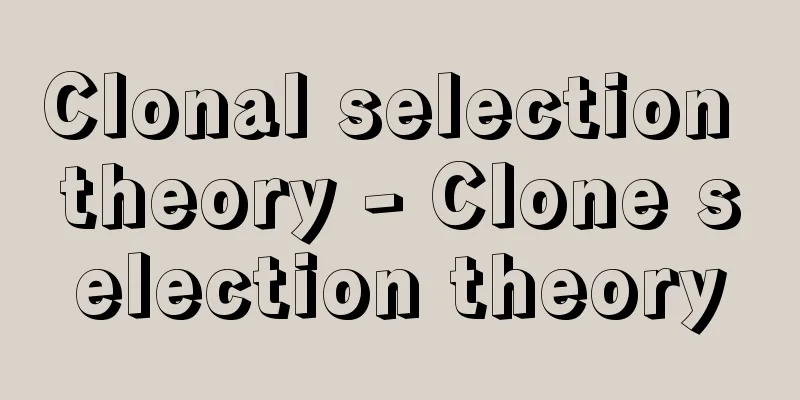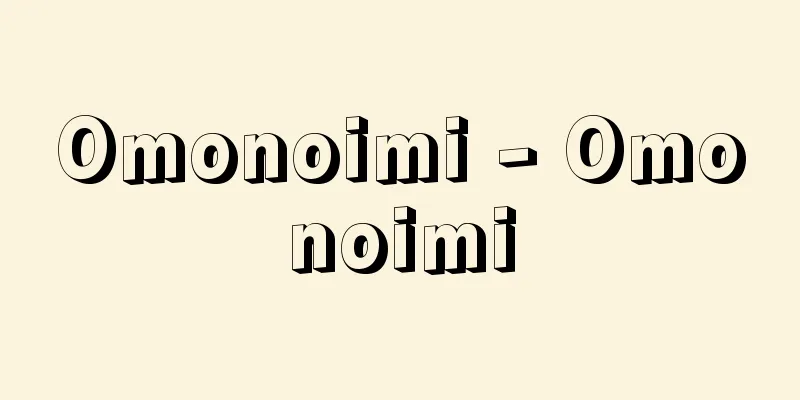Clonal selection theory - Clone selection theory

|
This is the current mainstream theory of the immune system. There are many cells that produce one type of antibody, and only the antibody-producing cells that correspond to the antigen are selectively stimulated to grow, forming a group of homogeneous cells (clones) that actively synthesize antibodies. It was proposed by FM Barnett of Australia (1957). Prior to this, the template theory, which states that the same antibody-producing cells have the potential to produce many types of antibodies, and that when an antigen is introduced, it becomes a template to determine the type of antibody, was also quite influential. In contrast to this, the clonal selection theory was presented. In this view, the genes for the antibody protein gamma globulin continue to exist within the individual from the beginning, and this fits well with the current conclusion of molecular genetics that genes do not change directly in response to environmental conditions. On the other hand, the number of antibody genes that should be prepared would be extremely large, but some calculations have suggested that this is not impossible. It is believed that when an individual has various antigens, the clones of antibody-producing cells that correspond to those antigens are inhibited from developing during development and are dropped off as so-called prohibited clones. Autoimmune diseases occur when this prohibition mechanism does not work properly. Source: Encyclopaedia Britannica Concise Encyclopedia About Encyclopaedia Britannica Concise Encyclopedia Information |
|
免疫機構について現在の主流をなす説。1種類ずつの抗体を生産 (産生) する細胞が多数あって,抗原によってそれに対応する抗体生産細胞のみが選択的に増殖を刺激されて,同種細胞の集団 (クローン) が成立し,抗体を盛んに合成するという考え。オーストラリアの F.M.バーネットが提唱した (1957) 。これ以前には,同一の抗体生産細胞が多種類の抗体生産の潜在能力をもっていて,抗原がくるとそれが鋳型となって,抗体の種類が決るという鋳型説もかなり有力であり,それと対照的なものとして,クローン選択説が提出された。この見方では,抗体であるγ-グロブリンという蛋白質のための遺伝子は最初から個体内に存在し続けていることになるので,遺伝子は環境条件に直接に対応して変化しないという,現在の分子遺伝学の結論によく合致する。その反面,準備されているべき抗体用遺伝子の数はきわめて多数となるが,これは考えられないことではないとの試算なども行われている。個体自身がもつ各種抗原に対しては,発生途上でそれら抗原に対応する抗体生産細胞のクローンは発育を差止められて,いわゆる禁止クローンとして脱落していくものと考えられている。この禁止機構がうまく作用しなかった場合に自己免疫病が生じる。
出典 ブリタニカ国際大百科事典 小項目事典ブリタニカ国際大百科事典 小項目事典について 情報 |
>>: Kronshtadt Rebellion - Kronshtadt Rebellion
Recommend
Image intensifier; image tube
A device that amplifies the intensity of images cr...
Side [town] - Waki
An old town in Mima County in northern Tokushima P...
Clarendon Code
A collective term for four laws enacted in England...
Large-leaved linden tree - Large-leaved linden tree
A deciduous tall tree of the family Tiliaceae (AP...
Hidemasa Koide
Year of death: March 22, 1604 (April 21, 1604) Yea...
Veto - veto
The power of one organ of a national or local gov...
Eastern Nine Tombs (English: Tonggunǔng)
Located in the vast hills of Inchang-ri, Guri-myeo...
Children's Scenes - Children's Scenes
Schumann's piano collection "Kinderszenen...
Dual voice - Sousei
〘Noun〙 A compound word consisting of two Chinese c...
Nagasaki Road
A modern trunk road in Kyushu, also known as the N...
Endoxa - Endoxa
…There is also a methodological distinction betwe...
Corbicula japonica
Mollusca, Bivalvia, Corbicula. Shell length 4cm, s...
Camelus
...A large herbivorous animal with a hump on its ...
Lin Zhao-en (English name)
[Born] 12th year of Shotoku (1517) [Died] 1598 A C...
Alacaluf (English spelling)
An indigenous people who live in southern Chile, s...









